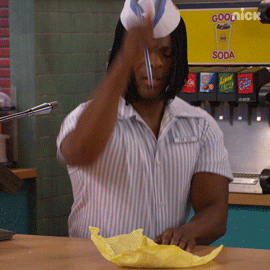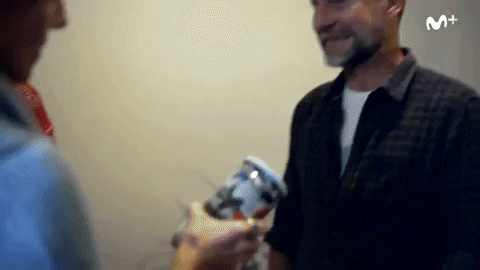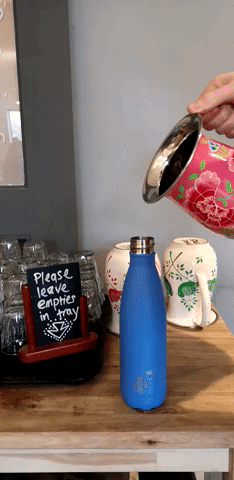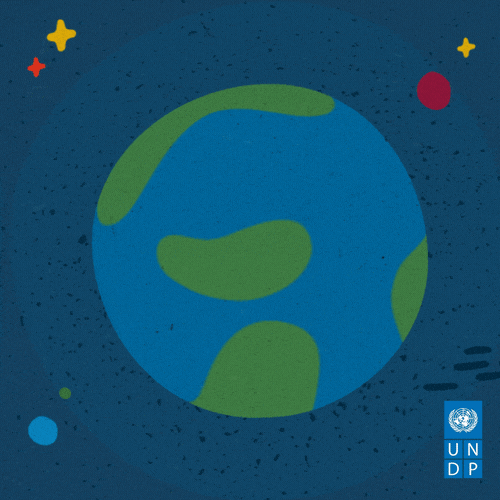So what exactly is zero-waste?
The simple answer is exactly in the name. The zero-waste movement aims to send nothing to landfill. The more complicated answer is to overhaul the system entirely making waste obsolete and creating a circular economy.
“Zero-waste seems extreme.”
Yes, it is. The term "zero waste" is extreme because it's a goal. A completely unattainable goal. It perpetuates the notion of perfectionism. "Zero" is an absolute word and I don't like dealing in absolutes. I prefer "low waste".
So, I just use a reusable straw right?

Yes and no. If you are a person that can drink without a straw, I suggest forgoing it altogether. But, zero waste is about more than just food, although it's a large aspect. In every part of your life that you can, the goal is to reduce the amount of waste you're producing. So reusable products are a must, so don't just stop at a straw. Repurpose and reuse everything that you possibly can.
What about a trash jar?

Trash jars are pretty popular on the internet with people boasting about how little trash they've made. But, this is pretty toxic in my opinion. You choose what you put in the trash jar. For example, if you decide to recycle a glass pickle jar. But, in order to do so, you'd have to peel off the label and put it into the trash. If you were worried about the amount of trash you're making, you might decide not to recycle the jar at all because you don't want to put the label into your trash jar. That makes no sense and seems way too extreme. Just do the best you can with what you have.
What are some essentials that I need?

You honestly don't need anything to start living a lower-waste lifestyle because the whole premise behind it, is that you use and reuse what you have. But there are definitely some things that make your life easier. Reusable things are pretty much the only things I would recommend. Reusable water bottles, Tupperware, cutlery, and bags are great.
What about composting?
Composting is a great way to reduce the number of things going into landfill. Food waste is a huge problem in the USA; 40% of the food we buy will be wasted. That number is astronomical. Food scraps can be stifled in landfill and produce methane, which contributes to global warming. So, if you can save food scraps, composting is a great way to make use of them. If you can't compost yourself, there are usually farmer's markets that will take compost. During the winter, check if anyone is composting in your area, or check out the local park service, they might be able to help you. As for the smell, rotting food smells bad. Keeping it in the freezer helps with the smell, but honestly, it's only up to a certain point.
What about sustainable clothing?
If you can buy it, get it. But a word of caution, a lot of companies 'greenwash', or they falsely claim that their companies are environmentally responsible. Oftentimes, they use 'natural' packaging or buzzwords like 'free from…' 'made with organic ingredients', or 'all-natural'. That doesn't mean they're environmentally friendly. So, in terms of clothes, upcycling or thrifting is essential. Why buy something and use more materials and resources when you can buy the product without it? I'm writing a guide to thrifting, so stay tuned for that. Essentially, make sure the product you're buying is good quality and that you actually need it.
What about hygiene products?
Reusable is the name of the game again. I use bar soap and I'm trying out a few different types of shampoo and conditioner. Shampoo bars don't really work on my hair, since it's a bit coarse and wavy. In this season of life, I like shampoo and conditioner that both come in plastic packaging. I'm looking for alternatives, but that's where I'm at right now. But, that's okay because low waste is not a competition. I have a plastic hairbrush that I've had for years; when it becomes too old, I will switch to a boar's bristle brush or comb, but this brush still has life. For everyone that has a period, they say menstrual cups, period panties, cloth pads, or organic pads and tampons. Reduce where possible, don't force yourself to do something that makes you uncomfortable. It's your body. I do recommend switching from conventional pads and tampons because they have a whole ton of chemicals that you don't want on or in your body.
What about skincare and makeup?
Skincare is also pretty hard to do low-waste. If you can't buy it in bulk, it's really hard to find recyclable products. I have dermatologist-prescribed skincare products, so I really don't have much choice in the matter, right now. But less is more. If you can cut some things out of your routine, maybe consider doing so. I used to use eye cream, but it never did anything for me, so I stopped. Also, try to use all of the product in the container. Lotion pumps don't get everything out of the bottle. I cut the bottle and add the remaining lotion into another container, wash out the lotion container, and recycle it.
Makeup is also pretty difficult to get low-waste. There are mascara cakes or lipstick cakes, but most people, including myself, aren't really interested. Use all the products, don't buy excess, and be smart about the brands you're buying from. Repurpose empty containers, you can reuse old mascara brushes as eyebrow spoolies.
What about transportation?
Yes, cars have a lot of carbon footprint. Carpool when you can, schedule errands back-to-back, and try to drive as little as possible. I use public transportation because I live in NYC and biking is also pretty popular. Just do your best.
This is by no means a comprehensive guide. Ever since being vocal about my transition into a lower waste lifestyle, I've gotten a lot of questions from family and friends, and these are the 10 most common questions I get. Just do your best, it doesn't have to be pretty or aesthetically pleasing.
It just has to work.











